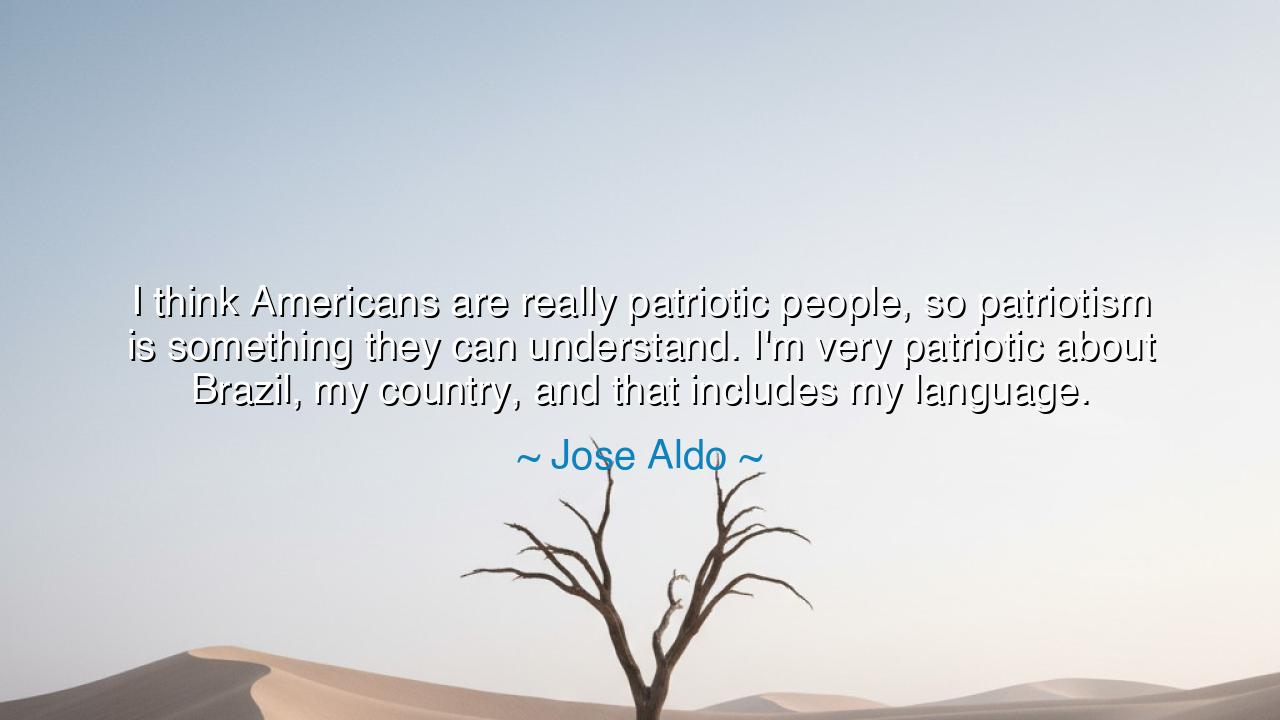
I think Americans are really patriotic people, so patriotism is
I think Americans are really patriotic people, so patriotism is something they can understand. I'm very patriotic about Brazil, my country, and that includes my language.






“I think Americans are really patriotic people, so patriotism is something they can understand. I'm very patriotic about Brazil, my country, and that includes my language.” Thus spoke José Aldo, the warrior of the arena, a man who carried not only his fists but the banner of his homeland into battle. His words are not merely about national pride; they are about the invisible thread that ties a man to his people, his soil, his tongue. For Aldo reminds us that patriotism is not confined to borders or armies—it is also found in the rhythm of speech, the melody of one’s language, the cultural breath that gives identity to a people.
The origin of this thought lies in the life of a fighter who rose from the favelas of Brazil to become a champion admired around the globe. Standing often in foreign lands, before audiences who cheered his victories but spoke another tongue, Aldo never forgot the soil from which he sprang. His pride in Brazil was not only in her flag and her anthem, but in the very sound of her words, Portuguese shaped by centuries of struggle, faith, and music. For him, to honor his language was to honor the living soul of his nation.
This idea finds echoes in the ancients. Consider Homer, who sang not in some foreign tongue of empire, but in the Greek of his people. His words preserved the spirit of a civilization, teaching loyalty, courage, and fate to generations unborn. Or recall Dante Alighieri, who chose to write his Divine Comedy not in Latin, the tongue of scholars, but in Tuscan, the tongue of his people. In so doing, he gave birth to modern Italian, proving that devotion to one’s language is itself an act of enduring patriotism.
Aldo also speaks of the shared understanding among peoples. He notes that Americans know patriotism, for it is woven into their national story: a revolution for liberty, a flag carried into battles, a pride in the ideals of freedom. Thus, when he declares his own devotion to Brazil, he builds a bridge across nations, showing that while the object of loyalty may differ—one to America, another to Brazil—the essence of patriotism is the same. It is the fire that calls men to cherish their roots, honor their ancestors, and preserve their heritage.
Yet there is a warning hidden here as well. To honor one’s country and language must not become disdain for others. True patriotism is not hatred but devotion, not walls but roots. It is possible to admire the love another has for their homeland while holding fiercely to one’s own. Aldo shows us this balance: respecting American pride while affirming Brazilian pride. This is wisdom for all nations in an age when misunderstanding and division so often cloud the bonds of humanity.
The lesson for us is profound: if you would be truly patriotic, do not only wave the flag or shout the anthem—live the virtues, preserve the culture, and guard the language of your people. For language is not mere sound; it is memory. When it fades, a nation’s soul weakens. When it is cherished, a nation endures even in exile. Each of us is called to honor the land of our birth or adoption, not only with grand gestures but with daily fidelity to its spirit.
Practical actions flow from this wisdom: speak your mother tongue with pride, teach it to your children, sing its songs, and honor its poetry. Celebrate your nation’s traditions, not as relics of the past but as living flames for the future. And when you meet another who loves their country as fiercely as you love yours, do not scorn them, but see in them a mirror of your own devotion.
So let Aldo’s words stand as both shield and torch: “I’m very patriotic about Brazil, my country, and that includes my language.” Remember that the heart of a nation is not only in its armies or riches, but in its people, in their words, in their songs, in their love. To wear this loyalty in your heart is to be not only a citizen of your homeland but a guardian of its soul.






AAdministratorAdministrator
Welcome, honored guests. Please leave a comment, we will respond soon